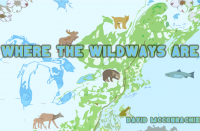This issue of Alternatives takes readers into a realm where the actions of government, corporations, citizens and middle institutions such as schools converge to transform society as we know it. It’s a place where the environment receives its due respect. Where, as peace activist Ursula Franklin suggested in a 1994 address at the University of Waterloo, the Canadian government looks at “nature in the way it looks at the United States: as a tremendous, sometimes dangerous power with which one must live.”
This issue of Alternatives takes readers into a realm where the actions of government, corporations, citizens and middle institutions such as schools converge to transform society as we know it. It’s a place where the environment receives its due respect. Where, as peace activist Ursula Franklin suggested in a 1994 address at the University of Waterloo, the Canadian government looks at “nature in the way it looks at the United States: as a tremendous, sometimes dangerous power with which one must live.”
 Read selected articles and web extras from this issue
Read selected articles and web extras from this issue
Here’s what else you get when you buy the issue:
Building the Environmental State – James Meadowcroft
What the history of social welfare tells us about the future of environmental policy.
Topping the Chart – Keith Neuman
Constitutionally Green in Wales – James Allan
Environmental Citizenship – Alex Latta
A model linking ecology with social justice could lead to a more equitable future.
Greening Politics -Robert Paehlke and Nicola Ross
Canada’s leaders strut their colours on the political stage.
Survey Says – Cara Camcastle
Green Party members overwhelmingly accept limits-to-growth and believe nature has an intrinsic value.
More than Nature – Andil Gosine
European Greens layer ingredients for political success.
Letters to the Editor
News & Notes
Science Desk – Steve Stockton
Climate change threatens circulation in the North Atlantic.
Traffic Jam – Matti Siemiatycki
Move over megaprojects; small, creative options unlock the grid.
Reviews
Bush’s Fringe Government, Garry Wills and Welcome to Doomsday, Bill Moyers The Concise Guide to Global Human Rights, Daniel Fischlin and Martha Nandorfy.
Publication of this issue was made possible by The Gosling Foundation; The Salamander Foundation; and the support from our many subscribers. We acknowledge the financial support of Canada’s International Development Research Centre (www.idrc.ca); EJLB Foundation; Friends of the Greenbelt Foundation; The McLean Foundation; Ontario Media Development Corporation; Ontario Trillium Foundation; Ontario Work Study Plan. We acknowledge the financial support of the Government of Canada through the Canada Periodical Fund (CPF) of the Department of Canadian Heritage toward our project costs. The support of the Faculty of Environment at the University of Waterloo and the Waterloo Environmental Studies Endowment Foundation is appreciated.’






 Read
Read 






